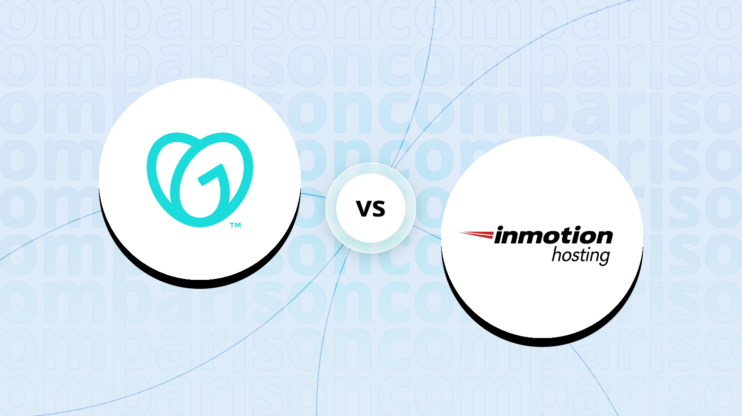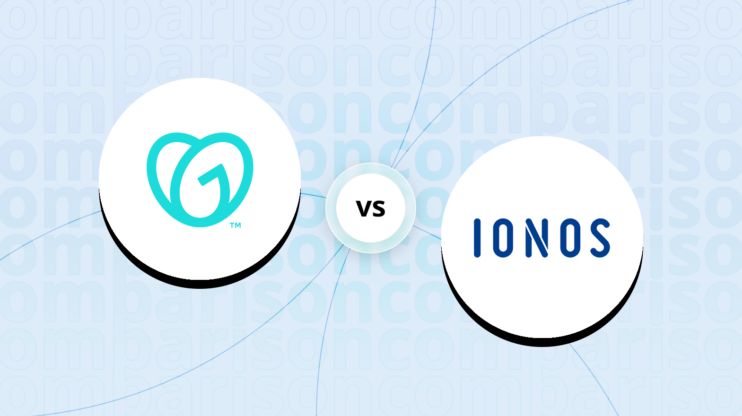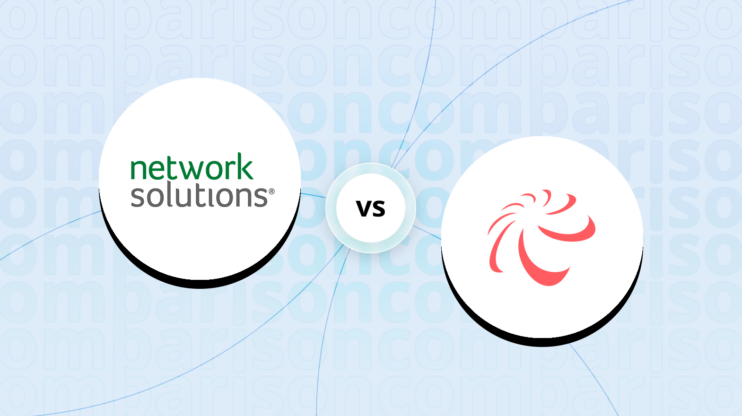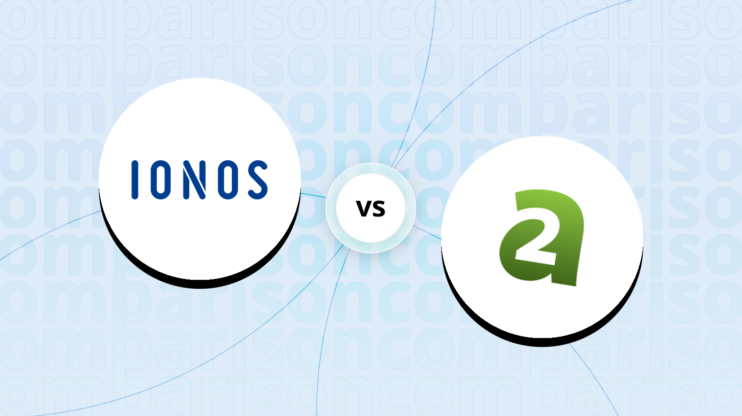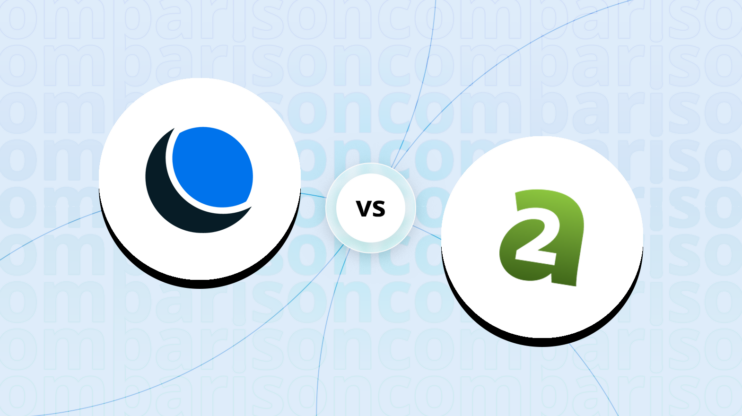Godaddy vs Hostpapa: Final verdict
Looking over GoDaddy vs. HostPapa, HostPapa emerges as a more versatile and customer-friendly web hosting provider.
-
HostPapa (Overall grade: 8.6)
offers a wide array of hosting options, including shared, WordPress, and VPS hosting, along with advanced features like NVMe storage and Cloudflare Enterprise CDN. Its performance is solid with high uptime and rapid load times. HostPapa provides extensive security features, including GlobalSign SSL and additional protections such as advanced bot protection and SQL injection prevention. It also excels in user management with detailed role capabilities and offers superior customer support options, including free one-on-one training sessions and multilingual support, catering well to both individuals and businesses.
-
GoDaddy (Overall grade: 7.8)
shines with its reliable performance and minimal downtime, boasting a 99.98% uptime rate and quick server response times. GoDaddy offers diversified plans with specific resources for WordPress and VPS hosting, making it suitable for high-traffic sites. The ease of use is emphasized through its cPanel interface and a free WordPress migration tool. However, GoDaddy falls short with less detailed user management features and inconsistent customer service experiences, along with higher renewal costs and aggressive upselling tactics, diminishing its overall value despite a strong starting pitch.
 Overall grade:7.8 |
 Overall grade:8.6 |
|
|---|---|---|
| Uptime and Availability | 8.6 | 8.5 |
| Hosting Performance | 8.1 | 8.6 |
| Hosting Security | 8.6 | 8.6 |
| Price | 7.7 | 8.6 |
| Hosting Features | 7.1 | 8.5 |
| Ease Of Setup | 8.7 | 8.7 |
| User Management | 5.0 | 8.1 |
| Customer Support | 8.2 | 8.8 |
| User feedback | 3.9/5 | 4.2/5 |
Hosting types offered
Both platforms provide a variety of hosting types, each designed to meet the different needs of users.
 |
 |
|
|---|---|---|
| Shared hosting | ||
| Cloud hosting | ||
| WordPress hosting | ||
| Ecommerce hosting | ||
| VPS hosting | ||
| Dedicated hosting |
Although both offer a variety of hosting plans tailored to different needs, in
certain cases, one platform may prove to be more suitable.
Detailed comparison
Uptime and availability
Evaluates the average uptime statistics, uptime guarantee and overall availability of the hosting
provider
Score Components:
- Uptime percentage (30%): evaluates the uptime statistics in given period of time
- Uptime guarantee (20%): Assesses if the platform offers an uptime guarantee and
whether the actual uptime matches the promised guarantee. - General performance (25%): Evaluates how fast is the average response time and overall
it’s stability. - Responsiveness (10%): Adaptability to different devices and screen sizes.
- Availability (25%): Reflects the total downtime and number of outages.
 8.6
8.6
 8.5
8.5
Section 1: Winner GoDaddy: A reliable hosting provider with minimal downtime and excellent performance.
Section 2: GoDaddy offers a solid 99.9% uptime guarantee and has shown higher reliability with a 99.98% uptime rate during testing. The average server response time is quick at 341ms, beating the shared hosting average of 600ms. Users can expect efficient global load times, with the Largest Contentful Paint consistently below 2.5 seconds.
Section 3: HostPapa also guarantees 99.9% uptime but achieved a 99.93% uptime during testing from Montreal. Their load time speeds are above average, with average times between 650 and 705 ms from various Canadian locations. HostPapa’s two-week monitoring showed zero outages, pointing to dependable performance. Transparency about maintenance and incidents adds to their reliability.
Which one has better hosting performance?
Score Components:
- Hosting speed (30%): This includes SSD quality, Load times, PageSpeed score ranges,
additional information on website speed, built-in plugins for performance enhancement, available caching
methods, and CPU/RAM options - CDN (20%): Considers whether CDN is available or not, whether it’s free or paid, and
the quality of the CDN service - Available data centers (30%): Evaluates the number of data centers and their locations
globally. - Scalibility (20%): Looks at whether elastic scaling is available, the process required
to scale (manual upgrade vs. automatic scaling), the presence of dedicated servers, and the costs
associated with scaling.
 8.1
8.1
 8.6
8.6
🏆 Winner
HostPapa: Exceptional speed and security features.
When comparing general performance, HostPapa and GoDaddy offer distinct advantages in hosting speed, CDN, and data centers. HostPapa employs NVMe storage, delivering three times faster data read/write speeds compared to traditional HDDs, while GoDaddy utilizes optimized servers for up to 40% faster response times. Both providers offer global CDN services; however, HostPapa includes a superior Cloudflare Enterprise CDN with 250 locations worldwide, whereas GoDaddy’s CDN details aren’t specified. HostPapa’s global edge hosting ensures superior delivery speed, and both providers offer data centers in key regions across North America, Europe, and Asia-Pacific.
Website Speed
Website speed with HostPapa is notably enhanced by its use of NVMe storage and Cloudflare Enterprise CDN, resulting in faster page load times and improved user experience. GoDaddy also aims for speed with optimized servers and a 99.9% uptime guarantee, yet it may lag behind HostPapa due to the absence of specific CDN details. HostPapa further benefits from its WordPress optimization tools which include pre-installed WordPress and Jetpack, making it the better choice for WordPress sites.
Scalability
Both providers offer scalable hosting solutions. GoDaddy provides various hosting plans and resources, but scaling often requires plan upgrades. HostPapa’s information on elastic scaling is not detailed, yet they offer dedicated servers and automated backups, which suggest they can handle site growth efficiently. GoDaddy offers dedicated resources in its Web Hosting Plus plans, with scaling options ranging from shared to VPS hosting, starting at $8.99/month for standard performance VPS. Accurate cost details for HostPapa’s scaling are unknown, leaving some ambiguity on their scaling costs.
Which one has better security features?
and regulatory requirements
Score Components:
- Technical security measures (40%): This includes encryption, firewalls, DDoS
protection, secure configurations, server monitoring, access control and availability of security addons
(e.g Sitelock security). - Operational security measures (30%): Encompasses data privacy, backups and data
redundancy. - Compliance and certifications (20%): Adherence to legal and regulatory requirements
(e.g., GDPR, HIPAA) and possession of certifications (e.g., ISO 27001, SOC 2). - Business and reliability (10%): Factors in the provider’s reputation, uptime
guarantees, and customer support.
 8.6
8.6
 8.6
8.6
🏆 Winner
HostPapa: A comprehensive suite of security features with robust protection for websites and data.
Both GoDaddy and HostPapa, have notable differences in their approaches to technical and operational
security, as well as in their compliance with regulations.
Technical security measures:
GoDaddy offers a range of SSL certificates, including AutoSSL, Managed SSL, and Self-Managed Certificates, ensuring robust security for websites. HostPapa, on the other hand, utilizes GlobalSign SSL Certificates with features like up to 256-bit data encryption and 99.9% browser recognition. Both providers have DDoS protection and Web Application Firewalls (WAF), but HostPapa additionally offers advanced bot protection and SQL injection prevention. GoDaddy provides automatic daily backups, while HostPapa has automated website backups, daily premium automated backups, and additional CDN-based security.
Operational security measures:
GoDaddy has multiple security measures in place, such as malware scanning and removal, daily backups, DDoS protection, and global data centers. It also uses CloudLinux and Cage FS for resource management and content protection. HostPapa includes features like daily malware scanning, real-time security notifications, and Protection Power, which offers comprehensive security solutions for malware and threat management. Both companies offer 24/7 customer support with GoDaddy providing chat, phone, and SMS, while HostPapa focuses on support for SSL certificate issues and installation.
Compliance and certifications:
GoDaddy is compliant with GDPR and provides a detailed privacy policy and training for its staff. HostPapa meets GDPR and PIPEDA requirements, stores data primarily in Canada, and transfers personal information to the US in compliance with the EU-U.S. or Swiss-U.S. Privacy Shield Frameworks. Both are PCI compliant, providing guidelines and support for maintaining a secure network and protecting cardholder data.
 |
 |
|
|---|---|---|
SSL certificate |
AutoSSL, Managed SSL, Self-Managed SSL |
GlobalSign SSL Certificates (Single and Wildcard SSL) |
Additional security features |
Malware scanning/removal, CloudLinux, Cage FS, DDoS protection, WAF |
Daily malware scanning/removal, Protection Power, SiteLock, automated backups |
PHP versions |
Latest PHP versions (Zend LTS for 7.4 and 8.0) |
Select PHP version and modules/options |
GDPR compliance |
Yes |
Yes |
HIPAA compliance |
Not specified |
Not specified |
PCI compliance |
Yes |
Yes |
Hosting features
Score Components:
- Domains (20%): Assesses the availability of a free domain, domain purchase options, and
pricing - Email (15%): Considers if the provider offers full email hosting, or is reselling
third-party service, and if the email is only transactional or not - Website builder (15%): Checks if website builder is available, and it’s user
friendliness and overall the level of customization allowed. - Staging environment (20%): Determines if a staging environment is available, allowing
for testing changes before going live. - FTP & SFTP accounts (10%): Evaluates if and how easily users can access FTP and
SFTP accounts - Git and SSH access (20%): Assess whether Git is integrated into the hosting service and
if SSH access is provided
 7.1
7.1
 8.5
8.5
🏆 Winner HostPapa: A versatile hosting provider with extensive features and user-friendly options.
Both GoDaddy and HostPapa offer a wide range of hosting features suited to different user needs, including various web hosting plans, VPS hosting, and managed WordPress hosting. GoDaddy emphasizes different levels of performance with plans tailored to specific needs, from standard to maximum performance. Unique selling points include a free SSL certificate, a free domain for a year, and free email hosting. However, GoDaddy’s domain registration policy requires the purchase of a domain at regular rates if the hosting service is canceled within the first term.
HostPapa, with its all-encompassing feature list, stands out for its unlimited SSD storage, unlimited email addresses, and additional security features like brute force detection and DDoS protection. HostPapa also offers a wildcard SSL certificate for one year and domain privacy for free during the first year, enhancing its appeal. HostPapa’s staging environment for WordPress and Jetpack pre-installed features support a seamless user experience, especially for WordPress users. The 30-minute training session provided by HostPapa can also be beneficial for new users looking to easily navigate their hosting service.
 |
 |
|
|---|---|---|
| Free domain | Yes, 1 year | Yes, 1 year |
| Free SSL | Yes, 1 year | Yes, 1 year (Wildcard) |
| Email hosting | Yes | Yes |
| Website builder | Free WordPress migration tool | WordPress Installer |
| Staging environment | Yes | Yes |
| FTP & SFTP accounts | No | Yes |
| Git and SSH access | No | Yes |
| Free backup | Yes, 1 year | Yes, 1 year, 1GB only |
| Money back guarantee | Yes, 30 days | Yes, 30 days |
a location.
As a result in rare cases the features mentioned here can differ from the ones you see on their websites.
Both providers support a range of users from beginners to experts with user-friendly website builders and WordPress staging areas. However, in terms of developer tools, both GoDaddy and HostPapa offer robust options including SSH access, support for multiple programming languages, and Git for version control, thus appealing to developers looking for advanced capabilities.
Email services:
GoDaddy offers free email hosting with each of its plans, making it straightforward for users to set up their email campaigns. HostPapa also provides unlimited email addresses, which may be more advantageous for businesses needing extensive email capabilities. HostPapa includes transactional email capabilities and access to integrated third-party email services like Google Workspace, while GoDaddy focuses on basic email hosting within the package.
Price
Score Components:
- Plan value (40%): What each pricing tier offers.
- Transparency and clarity (30%): Clearness of pricing structures.
- Flexibility of plans (20%): Range of options to suit different budgets.
- Hidden costs (10%): Additional expenses not included in the plan.
 7.7
7.7
 8.6
8.6
🏆 Winner HostPapa: HostPapa delivers exceptional value with comprehensive plans and numerous features at competitive prices.
Evaluating the pricing of plans among various hosting providers can be complex due to their differing pricing and renewal strategies. Additionally, certain plans require annual commitments, which adds to the difficulty of making comparisons. The prices listed are based on monthly commitments; plans requiring annual commitments are indicated. Additionally, although some providers offer identical plans for WordPress and shared hosting, we have created separate tables for each to enhance clarity.
GoDaddy and HostPapa offer a range of competitively priced hosting plans. GoDaddy’s shared hosting plans start at $5.99/m, whereas HostPapa’s start at $2.95/m, providing substantial discounts. Both offer various features such as free domains and SSL certificates. For WordPress hosting, GoDaddy starts at $12.99/m with numerous perks, while HostPapa’s plans start at $2.95/m, offering solid storage and essential backups. In VPS hosting, GoDaddy begins at $8.99/m, offering different CPU and RAM configurations, while HostPapa’s options start at $19.99/m, providing enhanced server performance.
 |
 |
|---|---|
|
Managed WordPress Basic $12.99/m
1 website, 10 GB NVMe storage, Weekly backups, Automated malware scans & removal. Value for price:7.0
|
WP Start $2.95/m
1 website, 100 GB SSD storage, 10 email addresses, WordPress staging. Value for price:8.5
|
|
Managed WordPress Deluxe $13.99/m
1 website, 20 GB NVMe storage, Daily backups, Enhanced security with DDoS protection and staging site. Value for price:7.5
|
WP Plus $5.95/m
10 websites, 100 GB SSD storage, 100 email addresses, WordPress staging. Value for price:8.6
|
|
Managed WordPress Ultimate $15.99/m
1 website, 30 GB NVMe storage, Daily + on-demand backups, AI tools, WooCommerce capabilities. Value for price:8.0
|
WP Pro $5.95/m
Unlimited websites, Unlimited SSD storage, Wildcard SSL Certificate, Automated Backups. Value for price:9.0
|
|
N/A
Value for price:N/A
|
WP Ultra N/A
Unlimited websites, Unlimited SSD storage, Jetpack Premium, Automated Backups 10GB. Value for price:8.8
|
 |
 |
|---|---|
|
Web Hosting Economy $5.99/m
1 website, 25 GB NVMe storage, Free domain & email, SSL for 1 year. Value for price:7.0
|
Essentials $2.95/m
2 websites, 50 GB NVMe storage, 10 email addresses, Free Website Builder. Value for price:8.6
|
|
Web Hosting Deluxe $7.99/m
10 websites, 50 GB NVMe storage, Free domain & email, Unlimited SSL. Value for price:7.2
|
Growth $6.95/m
10 websites, 100 GB NVMe storage, 100 email addresses, Website staging. Value for price:8.2
|
|
Web Hosting Ultimate $12.99/m
25 websites, 75 GB NVMe storage, Free domain & email, Unlimited SSL. Value for price:7.4
|
Premium $6.95/m
Unlimited websites, 200 GB NVMe storage, Unlimited email addresses, Domain Privacy (1 year). Value for price:8.3
|
|
Web Hosting Maximum $17.99/m
50 websites, 100 GB NVMe storage, Free domain & email, Unlimited SSL. Value for price:7.6
|
Elite $14.95/m
Unlimited websites, Unmetered NVMe storage, Fully Managed Web Application Firewall. Value for price:8.4
|
 |
 |
|---|---|
|
1 vCPU / 2GB RAM $8.99/m
1 vCPU core, 2 GB RAM, 40 GB NVMe SSD Storage, Snapshot backups. Value for price:7.5
|
Mercury $19.99/m
4 core CPU, 2GB memory, 60GB SSD storage, 1TB transfer. Value for price:7.8
|
|
2 vCPU / 4GB RAM $17.99/m
2 vCPU cores, 4 GB RAM, 100 GB NVMe SSD Storage, Snapshot backups. Value for price:7.8
|
Venus $59.99/m
4 core CPU, 4GB memory, 125GB SSD storage, 2TB transfer. Value for price:8.0
|
|
4 vCPU / 8GB RAM $34.99/m
4 vCPU cores, 8 GB RAM, 200 GB NVMe SSD Storage, Snapshot backups. Value for price:7.9
|
Earth $109/m
Not Specified. Value for price:N/A
|
|
4 vCPU / 16GB RAM $44.99/m
4 vCPU cores, 16 GB RAM, 200 GB NVMe SSD Storage, Snapshot backups. Value for price:8.0
|
N/A
Value for price:N/A
|
As a result in rare cases the prices displayed here can differ from the ones you see on their websites.
Enterprise plans
For enterprise customers, GoDaddy offers flexible and expansive VPS hosting plans starting at $8.99/m up to $44.99/m, providing a range of CPU, RAM, and storage options. HostPapa, on the other hand, provides higher-spec VPS plans tailored for heavy-duty tasks, starting from $19.99/m going up to $109/m, designed to cover resource-intensive operations. HostPapa’s Elite plan at $14.95/m offers unmetered storage and enhanced security, making it a strong contender for enterprises looking for scalability and security.
Godaddy vs Hostpapa: Ease of setup
platform.
Score Components:
- Site migration (25%): Assesses whether the provider offers tools for site migration,
either automated or manual, and whether these services are free or require a fee. - Admin panel usability (35%): Evaluates the type of admin panel provided, such as the
standard cPanel or a custom solution, focusing on its accessibility and user-friendliness for both
technical and non-technical users. - Setup features (20%): Examines the availability and ease of use of various setup
features, including FTP accounts, file managers, email account setup, PHPMyAdmin, and easy CDN
configuration. - Help center quality (20%): Measures the quality and accessibility of the provider’s
help center resources, including articles and tutorials.
 8.7
8.7
 8.7
8.7
🏆 Winner HostPapa: Streamlined WordPress setup and multilingual support resources.
GoDaddy offers an industry-standard cPanel, which is known for its accessibility and ease of use. Both technical and non-technical users will find the cPanel straightforward for managing their hosting accounts, installing applications, and handling backups. The intuitive layout allows for quick navigation and easier access to critical tools, such as DNS settings and email accounts. Additionally, GoDaddy’s control panel accommodates various user skill levels, with a clean interface geared towards minimizing the complexity of routine hosting tasks.
HostPapa, on the other hand, also employs the standard cPanel interface but enhances the user experience with zero-click WordPress installation. This feature eliminates initial setup hurdles, particularly for beginners. The design is similarly user-friendly, allowing customers to effortlessly manage their websites and email services. HostPapa’s admin panel aims to reduce the learning curve, ensuring users can access essential tools and perform site management tasks efficiently, regardless of their technical expertise.
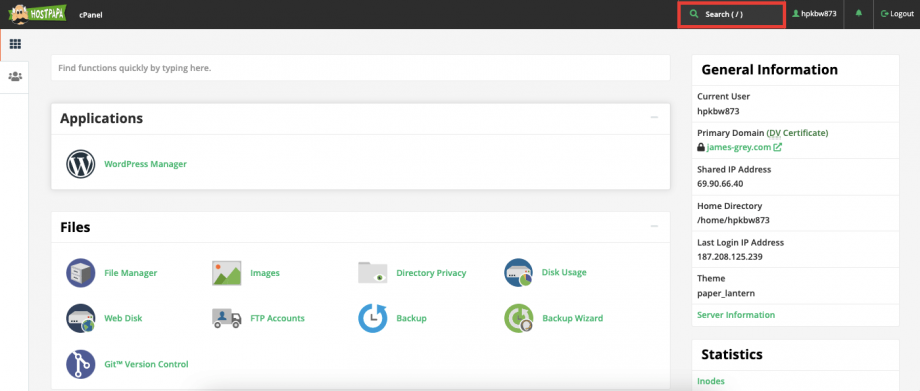
Both GoDaddy and HostPapa offer free migration tools, facilitating seamless website transfers without additional costs. GoDaddy provides a free WordPress migration tool, making it convenient to move an existing site with minimal downtime. HostPapa goes a step further by offering a free and painless website migration service from any provider, ensuring no downtime during the transfer process. Both hosting providers focus on making migrations as hassle-free as possible for users switching their hosting services.
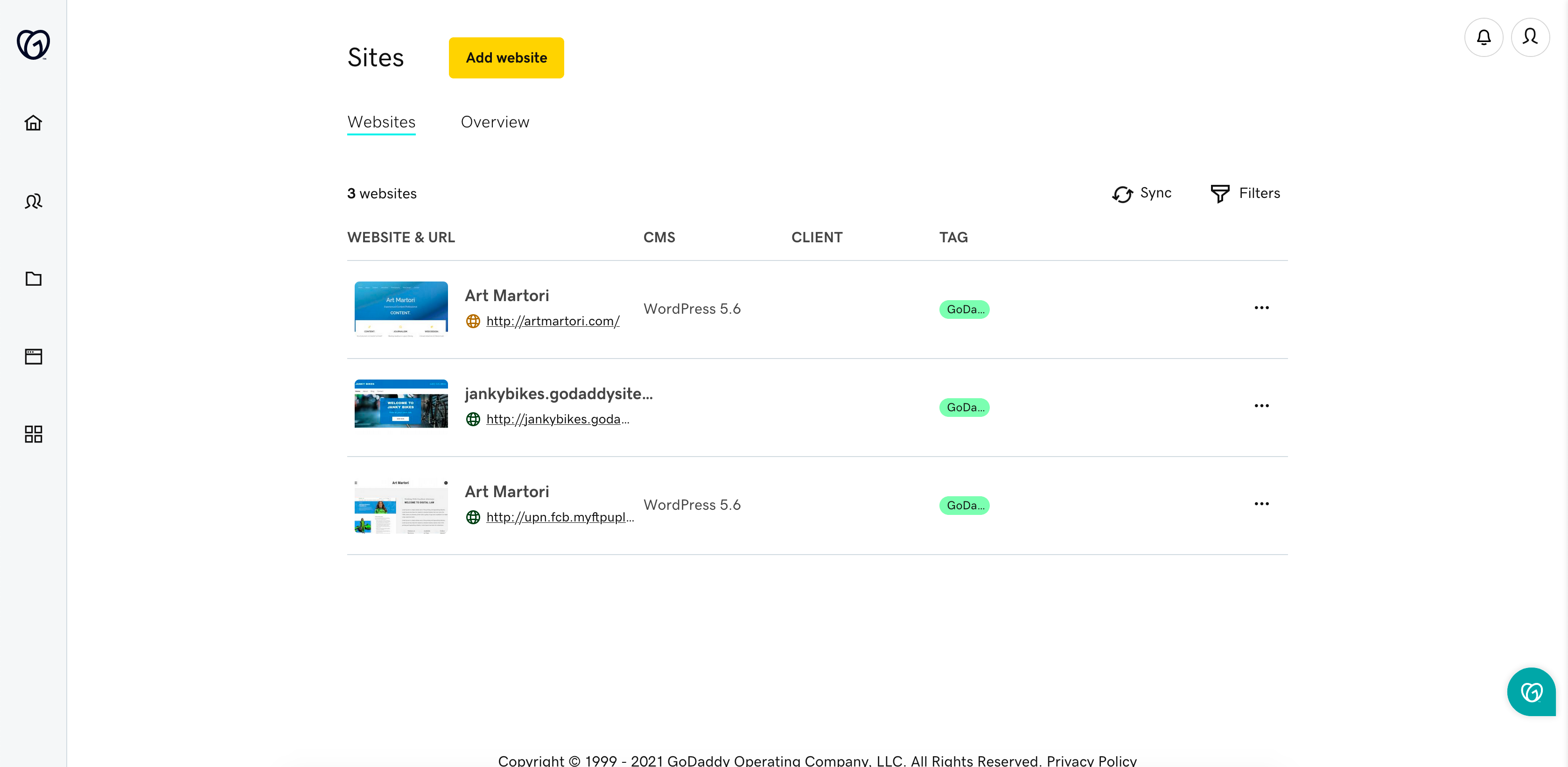
GoDaddy’s help center features 24/7 support via phone, chat, and SMS, complemented by a comprehensive FAQ section and a range of help articles covering various web hosting topics. Tutorials and guides available on their website further aid in resolving common hosting issues. HostPapa’s support resources include hundreds of searchable knowledge base articles, video tutorials, live chat, and one-on-one training sessions with their PapaSquad experts. Their award-winning multilingual customer support is available around the clock. The extensive resources provided by HostPapa support a smooth hosting experience for users, enhancing accessibility and understanding.
The platforms provide extensive knowledge bases filled with guides, how-to articles, and instructional content. GoDaddy offers a wide range of resources alongside 24/7 chat and phone support. HostPapa also boasts a detailed help center with an intuitive search function and around-the-clock support via live chat, phone, and ticketing, ensuring comprehensive user support.
User management
accessibility.
Score Components:
- Role customization (40%): Flexibility in creating and defining user roles and
permissions. - Ease of management (30%): User interface and tools for managing users.
- Access control (20%): Effectiveness of access control measures for different user
levels. - Scalability (10%): Ability to manage a growing number of users efficiently.
 5.0
5.0
 8.1
8.1
Winner: HostPapa: Offers superior user management and role capabilities, providing detailed settings and permissions.
HostPapa provides extensive user management features through Plesk, allowing for detailed and specific user roles and permissions. Users can create roles with various levels of access, from managing databases and files to configuring antivirus settings and log rotations. GoDaddy lacks detailed information on user management, making direct comparisons challenging. However, the detailed structure and flexibility in HostPapa’s Plesk setup demonstrate a clear edge in terms of user roles and permissions customization.
HostPapa’s Plesk interface presents a straightforward and efficient method for managing users. It streamlines the process of activating or deactivating accounts and creating roles. For each permission, the interface allows easy selection of granted or denied access. Unfortunately, specific interface details for GoDaddy are not provided, limiting the ability to compare user management tools directly. HostPapa’s detailed interface stands out, offering clarity and ease in managing user access and roles.
HostPapa ensures effective access control measures with a comprehensive list of permissions that include managing users, databases, mail accounts, and more. Its capability to grow with increasing user numbers is well-supported by these detailed settings. In contrast, GoDaddy’s user management capabilities remain unclear due to the lack of provided details. Based on available information, HostPapa’s thorough access control settings make it highly effective for managing an expanding user base and complex user requirements.
HostPapa User Roles Table
| Role | Description | Access Highlights |
|---|---|---|
| Manage users and roles | Allows managing additional users and user roles. | Permissions to add, edit, and remove user accounts and roles. |
| Create and manage sites | Enables creating domains, subdomains, and managing web hosting settings. | Permissions to set up new websites, modify host settings, and handle subdomains. |
| Configure log rotation | Manages log rotation settings for proper log management and storage. | Permissions to adjust log file settings and intervals for rotation. |
| Configure spam filter | Manages SpamAssassin settings for all mailboxes (requires `Create and manage mail accounts` permission). | Permissions to configure spam filters on mailboxes, necessitating certain mail account permissions. |
| Configure antivirus | Manages antivirus settings for all mailboxes (requires `Create and manage mail accounts` permission). | Permissions to adjust antivirus settings, requiring mail account management permissions. |
| Create and manage databases | Allows creation and management of databases and database users, and export/import backup dumps. | Permissions for database creation, user management, and backup operations. |
| Configure and perform data backup | Manages backing up and restoring the configuration and content of subscriptions the user has access to. | Permissions to perform backups and restorations effectively. |
| View statistics | Provides access to view Plesk and web statistics. | Permissions to see detailed site statistics and platform performance data. |
| Install and manage applications | Enables the installation and management of web applications. | Permissions to install, update, and remove applications. |
| Design sites in Presence Builder | Allows designing sites using the Presence Builder tool. | Permissions to use tools for creating and designing websites. |
| Upload and manage files | Enables uploading and managing files using the File Manager. | Permissions to handle file uploads and adjustments in the File Manager. |
| Create and manage additional FTP accounts | Manages creation and management of other FTP users. | Permissions to create, delete, and manage secondary FTP accounts. |
| Manage DNS settings | Manages DNS settings. | Permissions to configure DNS records and settings. |
| Create and manage mail accounts | Allows creation and management of mail accounts. | Permissions to add and modify mail user accounts. |
| Create and manage mailing lists | Manages creation and management of mailing lists (requires `Create and manage mail accounts` permission). | Permissions to handle mailing lists, depending on mail account permissions. |
Customer support
hosting provider.
Score Components:
- Support communication channels (30%): Measures the variety of customer support types
provided (live chat, chatbot, email, phone, etc.) - Availability (20%): Assesses the availability hours for each channel, including 24/7
support options. - Technical support quality (30%): Assesses whether the provider offers comprehensive
technical support, including hardware upgrades (e.g., HDD to SSD), software installations, and web
server configuration changes. - Enterprise support (20%): Checks if there are dedicated or priority support services
for enterprise-level customers.
 8.2
8.2
 8.8
8.8
🏆 Winner
HostPapa: An excellent choice for hosting services owing to its superior customer service options and high customer satisfaction scores.
 |
 |
|
|---|---|---|
Phone support |
||
Live chat support |
||
Chatbot |
||
Email/ticket support |
||
Enterprise support (dedicated agent, priority support) |
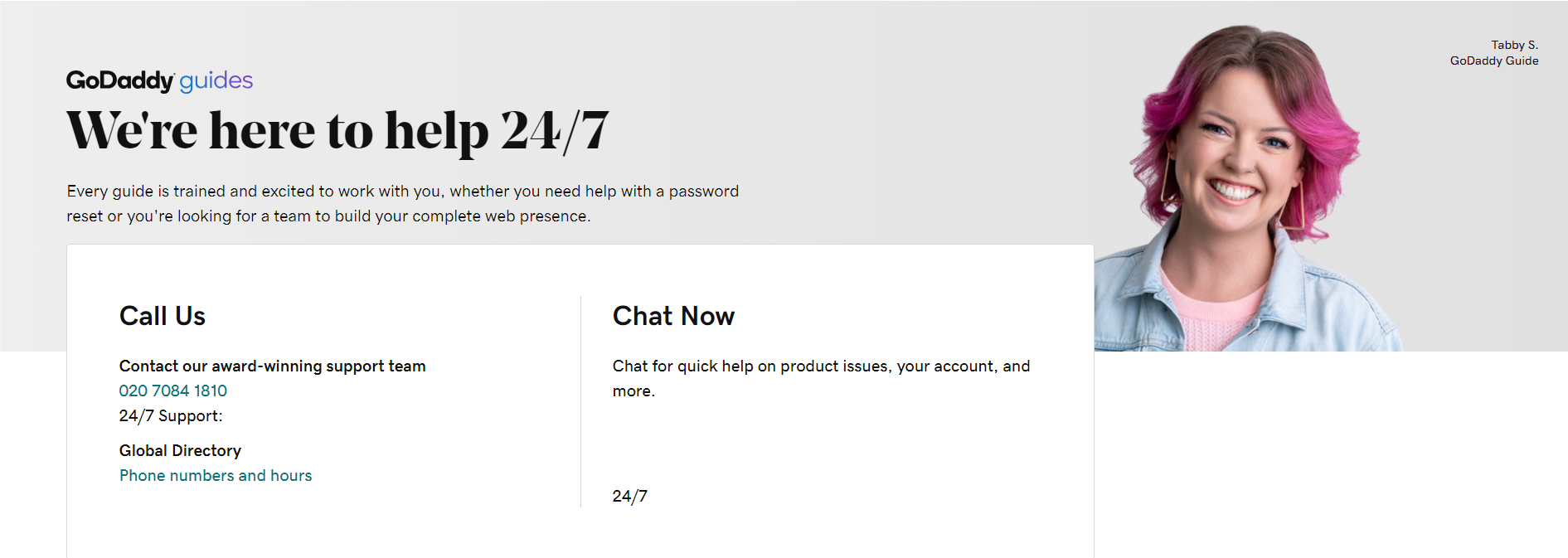
GoDaddy provides extensive customer support with 24/7 availability via phone and email, a live chat option on the US subdomain, and a large, diverse knowledgebase. With additional features like SMS support, automatic daily backups, and a free WordPress migration tool, GoDaddy ensures a well-rounded customer experience. Global data centers and strong security measures including DDoS protection add to its appeal. For users needing immediate assistance, the contact options and knowledgebase resources are comprehensive and accessible.
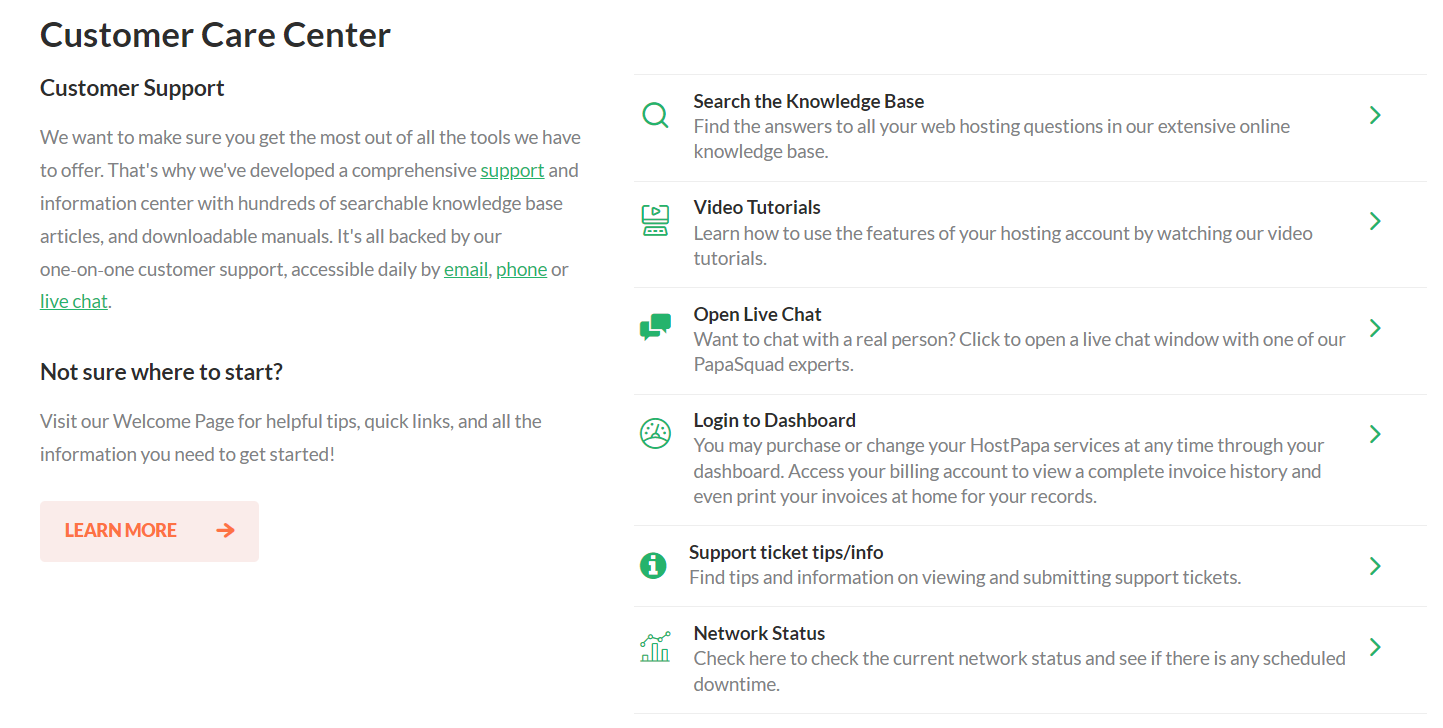
HostPapa edges ahead with its 24/7/365 support available through multiple channels including email, phone, live chat, and support tickets, catering to a global audience with various local phone numbers. HostPapa also offers free one-on-one training sessions and a current network status page. The positive reviews highlight the responsiveness and helpful nature of their support team. HostPapa’s knowledge base and video tutorials enhance the user experience, offering both reactive and proactive support options.
Godaddy vs Hostpapa: User feedback
GoDaddy generally receives praise for its ease of use, affordability, comprehensive service offerings, and user-friendly interface, making it a popular choice for domain registration and basic web hosting. Many users appreciate the ability to purchase domains, web hosting, email services, and other digital products all in one place, along with frequent discounts for new customers. However, customer service experiences are inconsistent; while some users find it helpful and responsive, others report long wait times and unknowledgeable support staff. Additionally, recurring issues include high renewal costs, persistent upselling, and occasional technical difficulties.
Overall, customers generally appreciate the ease of use, responsive customer support, and affordability of the hosting provider. Many users specifically highlight the excellent technical support and straightforward interface as significant advantages. However, some reviews mention downsides such as occasional transparency issues with billing, aggressive upselling tactics, and sporadic performance concerns like downtime or slow website speeds due to outdated technology. There are also mixed experiences regarding customer service efficiency, with some users facing frustrating delays while others commend the quick and knowledgeable support team.
Godaddy vs Hostpapa: FAQ
Which platform is better suited for hosting WordPress websites?
Both GoDaddy and HostPapa offer managed WordPress hosting with essential features like automatic updates and security measures. HostPapa stands out with its use of NVMe storage and Jetpack pre-installed for enhanced performance, making it a superior choice for WordPress sites. GoDaddy also provides reliable WordPress hosting but may lag behind in specific performance aspects compared to HostPapa.
Which hosting service offers better security features?
HostPapa offers a more extensive array of security features, including GlobalSign SSL certificates, daily malware scanning, advanced bot protection, and SQL injection prevention. While GoDaddy provides robust security measures such as AutoSSL, DDoS protection, and Web Application Firewalls, it lacks some advanced protections that HostPapa includes. Thus, HostPapa emerges as the winner in terms of overall security offerings.
Which platform offers better customer support?
HostPapa edges ahead in customer support by offering 24/7/365 support through multiple channels including email, phone, live chat, and support tickets. It also provides free one-on-one training sessions and a comprehensive knowledge base. GoDaddy offers extensive support options as well, including phone, live chat, and SMS support, but experiences with their customer service can be inconsistent.
Which hosting service offers more scalability options for growing websites?
Both GoDaddy and HostPapa offer scalable hosting solutions; however, GoDaddy provides more detailed and varied scaling options within its VPS hosting and Web Hosting Plus plans. HostPapa, while offering scalable dedicated servers and automated backups, lacks detailed information on elastic scaling compared to GoDaddy’s comprehensive options.
What are the major differences in pricing and value between godaddy and hostpapa?
GoDaddy’s shared hosting plans start at $5.99/m while HostPapa’s start at $2.95/m, offering more competitive prices. Similarly, HostPapa’s WordPress hosting plans start at $2.95/m compared to GoDaddy’s starting at $12.99/m. HostPapa provides additional features like unlimited SSD storage and security features, making it a better value for its price. GoDaddy’s renewal costs and aggressive upselling tactics can diminish its overall value despite a strong initial offering.
The making of this blog
We followed a clear, step-by-step process to write and research this article.









